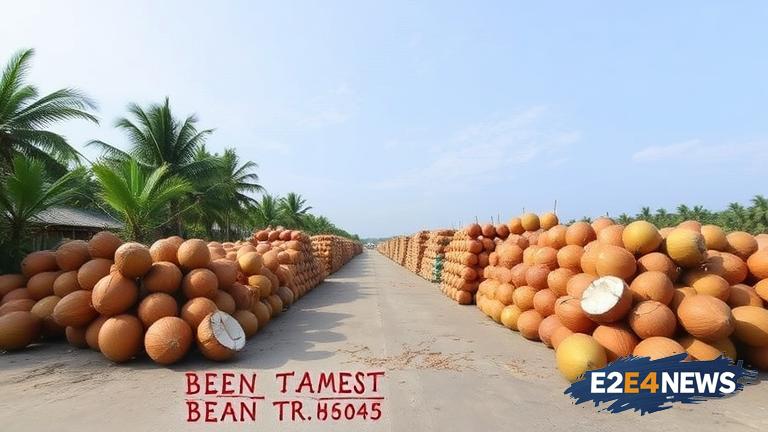Vietnam has witnessed a substantial rise in the export of fresh coconuts to China, with nearly 22 tonnes being shipped through the Bac Luan II border gate. This development is a testament to the growing trade relations between Vietnam and China. The export of fresh coconuts is a significant milestone for Vietnam, as it showcases the country’s ability to produce high-quality agricultural products that meet the demands of the Chinese market. The Bac Luan II border gate has emerged as a crucial trade route, facilitating the exchange of goods between Vietnam and China. The fresh coconuts exported to China are sourced from various regions in Vietnam, known for their rich soil and favorable climate. The coconuts are carefully selected, processed, and packaged to ensure they meet the stringent quality standards of the Chinese market. The export of fresh coconuts to China is expected to have a positive impact on Vietnam’s economy, as it will generate significant revenue and create employment opportunities for farmers and workers involved in the coconut industry. The Vietnamese government has implemented various measures to support the coconut industry, including providing subsidies to farmers and investing in infrastructure development. The country has also established trade agreements with China, which has helped to increase exports and reduce trade barriers. The demand for fresh coconuts in China is on the rise, driven by the growing middle class and increasing consumer preference for healthy and nutritious food products. Vietnam is well-positioned to capitalize on this trend, given its proximity to China and its ability to produce high-quality coconuts. The export of fresh coconuts to China is also expected to have a positive impact on the environment, as it will help to reduce carbon emissions and promote sustainable agriculture practices. The use of eco-friendly packaging materials and transportation methods will also contribute to reducing the carbon footprint of the export process. The Vietnamese government has also launched initiatives to promote sustainable agriculture practices, including the use of organic fertilizers and crop rotation techniques. The coconut industry in Vietnam is expected to continue to grow, driven by increasing demand from China and other countries. The industry is also expected to create new opportunities for farmers and workers, particularly in rural areas where coconut production is a significant source of income. The export of fresh coconuts to China is a significant achievement for Vietnam, and it is expected to have a positive impact on the country’s economy and environment. The Vietnamese government will continue to support the coconut industry, through initiatives such as trade promotion and infrastructure development. The country will also focus on improving the quality and safety of its coconut products, to meet the increasingly stringent standards of the Chinese market. The future of the coconut industry in Vietnam looks promising, with increasing demand from China and other countries, and a growing focus on sustainable agriculture practices. The industry is expected to continue to grow, driven by government support and increasing consumer demand for healthy and nutritious food products.





